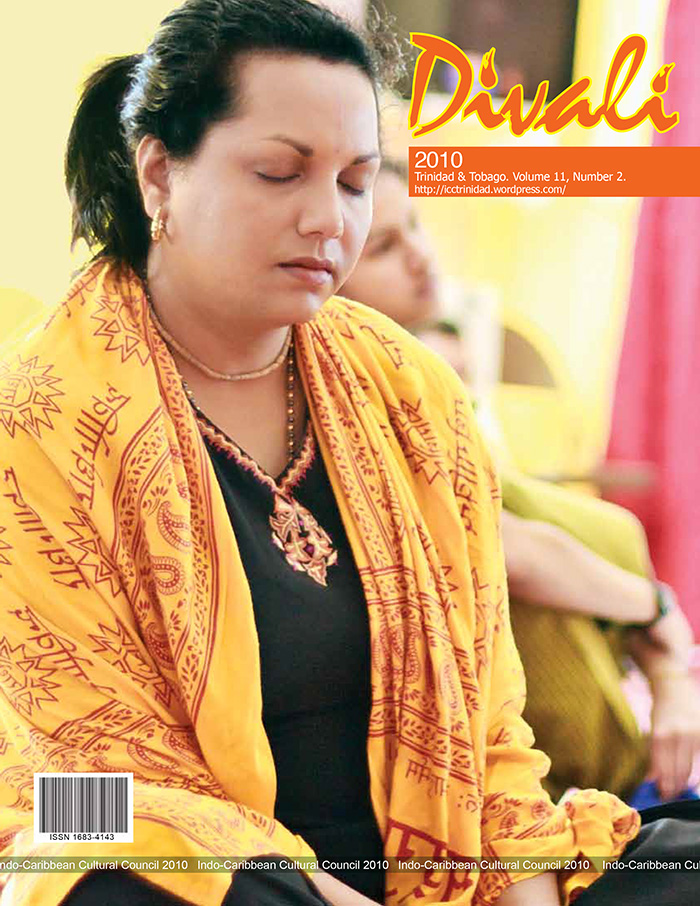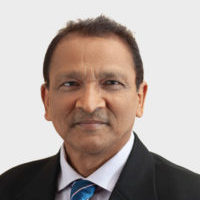
Divali festival souvenir magazine 2010
Indo-Caribbean Cultural Council (ICC) is proud to announce the publication of its latest Divali souvenir magazine. Divali, the Hindu Festival of Lights, was observed as a national holiday on Friday November 5, 2010.
The theme of this year’s edition of the magazine is “Hindu sects in Trinidad.” According to the 1990 official census data, Hindus in Trinidad form the second largest religious group in the country, after Roman Catholics. Roman Catholics comprise 29% of the population, Hindus 24%, Anglicans 11%, Muslims 6% and Presbyterians 3%. In a population of over one million, approximately 238,000 persons are Hindus.
Hinduism remains one of the oldest living religions in Trinidad and the wider world. Christians are divided into sects such as Catholicism, Anglicanism, Evangelicalism and Pentecostalism. Hindus are also separated into various sects. Traditionally, they have been branched into four main denominations: Vaishnavism, Shaivism, Shaktism and Smartism.
In Trinidad, Hindus can be further categorised conveniently into sects such as Sanatanist, Arya Samaj, Kabir Panth, Sikh, Shivnarine/Sieunarine, Lord Murugan, Mother Kali, Hare Krishna, Sai Baba, Ganapathi Sachchidananda, Radha Madav, Chinmaya Mission and the Divine Life Society. It is not a simple task to categorise Hindus since they are often open and versatile in their beliefs, practices and affiliations.
Read Online
October-November 2010
11 x 8 ½ inches
80 pages with advertisements and articles
ISSN 1683-4143
Glossy pages and cover
TABLE OF CONTENTS
- About Divali in Trinidad and Tobago
- Hindu sects in Trinidad and Tobago - Editorial
- Greetings from the Prime Minister of Trinidad and Tobago - The Honourable Kamla Persad-Bissessar
- Greetings from Minister of Arts and Multiculturalism - The Honourable Winston Peters
- Greetings from the High Commissioner of India - Mr. Malay Mishra
- Sanatanist sect - How Hinduism differs from Christianity
- Sanatanist sect - The Hindu sacred texts
- Sanatanist sect - Hindu philosophies, beliefs and practices
- Sanatanist sect - The caste system and conversion
- Arya Samaj sect - Its founder and the Trinidad missionaries
- Arya Samaj sect - Local organisations, celebrations and ceremonies
- Arya Samaj sect - Its primary schools and contribution to local Hinduism
- Kabir Panth sect - Its founder and his poems and songs
- Kabir Panth sect - Its local organizations, schools and temples
- Kabir Panth sect - Its main prayer ceremony and its rituals
- Sai Baba sect - Its founder and his followers
- Sai Baba sect - Its philosophy, ceremonies and rituals
- Sai Baba sect - Its centres and their charitable activities
- Swami Ganapathi sect - Its founder and his philosophy
- Swami Ganapathi sect - Its sacred river, temple, school and medical clinic
- Swami Ganapathi sect - Its publications, seminars, orchestra and music therapy
- Mother Kali sect - Its priests and their healing practices
- Mother Kali sect - Its priests who spiritually elevate in trance
- Chinmaya Mission sect - Its founder and his local missionary Swami
- Chinmaya Mission sect - Its temple complex and schools
- Chinmaya Mission sect - Its classes in Vedanta, Sanskrit, yoga, music, etc.
- Sikh sect - Its founder, scriptures and local temples
- Sikh sect - Its practices in the temple
- Sikh sect - Items of clothing for the baptised
- Hare Krishna sect - Its founder and the movement worldwide
- Hare Krishna sect - Its scriptures, main mantra and songs
- Hare Krishna sect - Its local temples, festivals and conversion activities
- Radha Madhav sect - Its founder, his missionaries and their visit to Trinidad
- Radha Madhav sect - Its charitable and humanitarian work
- Radha Madhav sect - Its celebrations, congregations and local centres
- Divine Life sect - Its founder, local Swami and its centres
- Divine Life sect - Its significant contributions to local Hinduism
- Lord Murugan sect - Its main deity and proposed temple
- Lord Murugan sect - Its ceremonies, symbols and rituals
- Shivnarine/Sieunarine sect - Its founder and its main scripture and ceremony
- Shivnarine/Sieunarine sect - Its local priests and its practices

is a full-time anthropologist at the University of Guyana (UG) and Fellow of The Eccles Centre for American Studies, British Library (2022-23). He is a former Assistant Professor at the University of Trinidad and Tobago (UTT). He obtained his Ph.D. in Anthropology from the University of Florida (UF). As a doctoral student, he won a Florida Caribbean Institute Award, an A. Curtis Wilgus Grant, and an Organization of American States (OAS) Fellowship.
Mahabir received a National Award (Hummingbird Silver Medal) for his contribution to education in his country in 2011. He was among 50 recipients who received a Distinguished Alumni Award from the UWI Alumni Association.
Mahabir is the author of 12 books to date.
